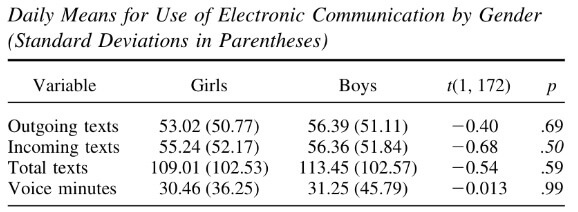
For four years, nearly 200 high school students in Dallas voluntarily allowed every text, email, and IM to be monitored. That these youth would sign off on such an invasion of privacy, especially in light of the content that was discovered within their communication, shows how much the next generation has changed their views on privacy. Students allowed a team of researchers to capture all of their messaging, whether it was completely innocent or contained swearing, sexual references, and even drug deals, to the tune of 500,000 texts per month in exchange for a free BlackBerry!
With a $3.4 million grant from the NIH, Dr. Marion Underwood from the School of Behavioral and Brain Sciences at The University of Texas-Dallas embarked on the study with the goal of investigating the formation and maintenance of friendships as well as the dynamics of social and physical aggression. The students signed up in 2003 as 4th graders (with their parents consent) for the research, which at the time was named “The Friendship Project.”
For the next four years, students and parents would be interviewed and would self report about friendships, but valuable information about relationships and social interactions is lost when relying only on self reporting and interviewing. But in 2007, with the students one year away from entering high school, Dr. Underwood got a BlackBerry and saw the potential for tracking all of the students’ communication.
The study was then transformed into the more ominously titled “The BlackBerry Project.”
To continue to participate in the study, students agreed to have all of their electronic communication stored in a database. Those who did received a new BlackBerry complete with unlimited messaging, a data plan, and voice minutes. Every year through high school, the students have been given a new BlackBerry, and now as seniors, they have produced an enormous amount of data, a virtual window into the lives of teens. It’s clear that the researchers will be crunching on the data for a long time.
According to Forbes, Dr. Underwood indicated that concern over privacy among the students and their parents have been a non-issue (probably for different reasons).
Details about the success of the methodology in tracking teen communication were released in a recent paper published in Developmental Psychology. The paper describes a data set collected from a two-day window over homecoming, which included a football game and a dance. For parents, some unsettling statistics from the 43,000 texts emerged (which comes out to 127 texts per participant per day). The data shows that students were rather open in their communication with nearly seven percent of texts contained either profane or sexual language. Contrary to other studies and perhaps popular opinion, girls texted to the same degree as boys. Not only did many students report using their BlackBerry always or most of the time, the overwhelming majority reported liking the BlackBerry a great deal.

The teens were from homes in the Dallas area that spanned the entire income range. Additionally, their racial distribution (50% Caucasian, 23% African American, 15% Hispanic) is also approximately representative of the demographics of other major U.S. cities, such as Boston.
While it is shocking to some that kids would so willingly allow their most intimate conversations to be mined for data about everything from bullying to suicidal thoughts, it is easy to underestimate the value of a smartphone to today’s teens. The Pew Internet and American Life Project found that among 12 to 17 year olds, 75 percent own cell phones. Additionally, over 70 percent of teenagers text message regularly and have unlimited text messaging plans. A student without a cell phone is left out of the biggest social scene at school and lacks convenient access to the web, which is a global social club.
But beyond gadget envy, the willingness of the participants reflects a shift in the generational attitude about privacy.
A 2007 Zogby poll found a markedly different perspective about privacy between younger Americans and older age groups. For instance, according to the poll, around 1 out of 3 respondents aged 18-24 felt that their privacy would be violated if someone posted a picture of them in their swimsuit, whereas nearly 2 of 3 older respondents agreed. Furthermore, 1 out of every 5 of the younger people said that who they had dated was too private for the web, but over half of the older demographic said it would be an invasion of their privacy if someone accessed their dating profile without their consent. Altogether, the generational disparity disappeared in one area: 91 percent said that expectations about privacy have changed due to technology and the Internet.

In terms of privacy within the study, Dr. Underwood describes how she and the two others on the team with access to the database went to great lengths not to betray the confidence of the teens to their parents, even when some of the kids ran away from home or illegal activities were being discussed. And students were well aware that the “BlackBerry people” were watching but indicated trust that they wouldn’t be reported for what was texted.
This suggests that privacy was important to the students when it came to passing information to their parents, but not to complete strangers.
With the mound of data the team is sitting on, this is not the last we’ll hear from the Blackberry Project. Furthermore, researchers and companies around the world now have a winning game plan for the Free-Phone-For-Data strategy. While older generations and privacy advocates might be appalled at that prospect, the younger generations will likely think “What’s the big deal?” And that difference explains volumes about the underlying difference between how different generations use social media and the web in general.
It’s safe to say, privacy doesn’t mean the same thing to the younger generation as it does to the older and, just as many suspected, you can thank the web and technology for that.
[Sources: APA, Forbes, PR Newswire]


